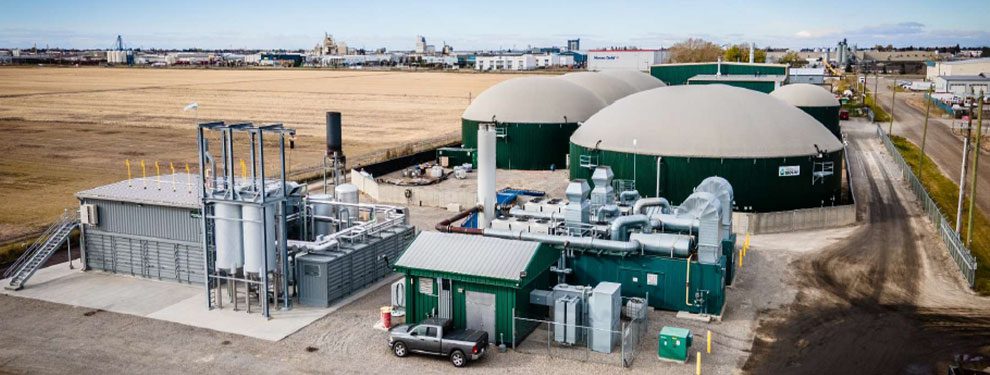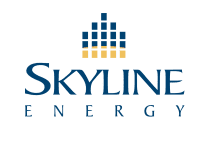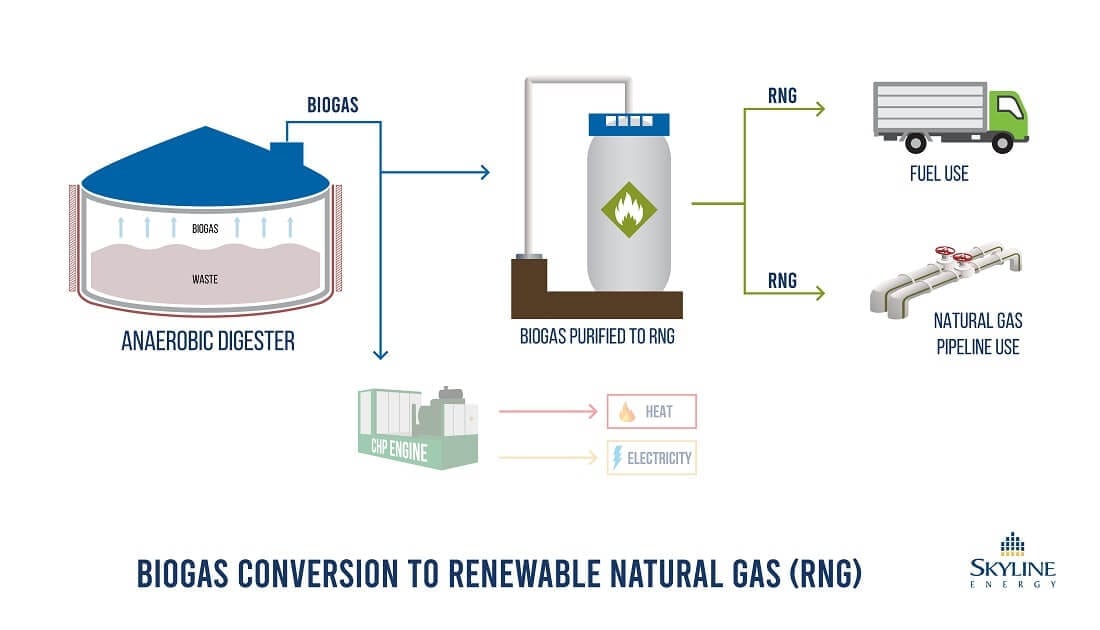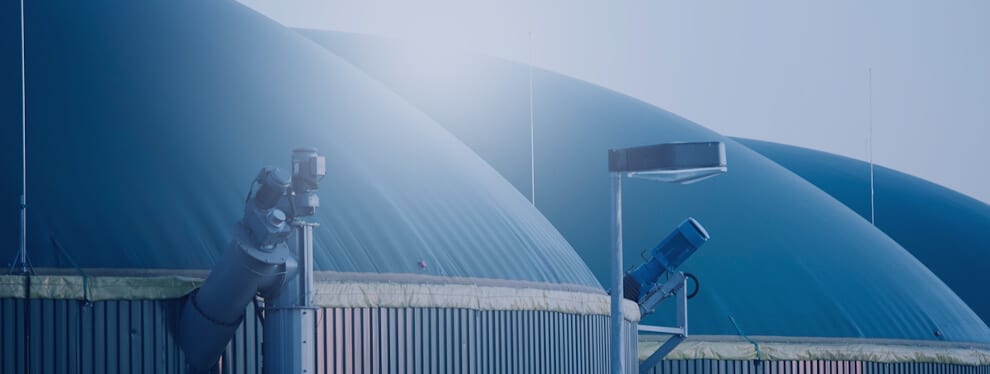
Skyline Energy Explains: The Difference Between Biogas and Renewable Natural Gas (RNG)
February 25, 2021 Press Releases
Many biogas facilities produce an end product of Renewable Natural Gas (RNG). The term “RNG” is often used interchangeably with “biogas,” but there is actually a notable difference between the two.
What is Renewable Natural Gas?
RNG is biogas that has gone through the further step of refinement. Essentially, it is a more pure, methane-rich form of biogas that is used as a fuel source.
As noted in our previous article about biogas and Combined Heat & Power (CHP), a higher concentration of methane is preferred for efficiency reasons; if the gas is methane-rich, less of it will be required to deliver a certain amount of fuel.
When used as fuel, RNG is known by several additional terms, such as biomethane, and, in the context of charging electric vehicles, BioNGV (Natural Gas for Vehicles).
How is Biogas upgraded to Renewable Natural Gas?
The objective of upgrading, or refining, biogas to RNG is to make it as methane-rich as possible (as much as 99%) and therefore suitable for pipeline fuel or used in EV charging. In order to do so, the refinement process removes as much carbon dioxide (CO2) from the biogas as possible. It also removes traces of sulphur and other minor gases.
There are multiple types of technologies available for upgrading biogas to RNG, such as amine scrubbing and water wash (classified as “wet” upgrading systems), and membrane separation and pressure swing absorption (both classified as “dry” upgrading systems). The wet upgrading systems use a liquid solution to separate the methane from carbon dioxide; the dry upgrading systems instead use pressure for physical separation of the two compounds.
Detailed descriptions of these technologies are available at Biocycle.net.
What are the environmental advantages of using Renewable Natural Gas?
The largest advantage of RNG is that it is a similar grade to traditional natural gas, but it is not a fossil energy source (a depletable energy source).
RNG is a carbon-neutral energy source. When traditional fossil fuels are produced, methane is released into the atmosphere as a harmful greenhouse gas.
In the case of RNG, methane is not the byproduct, but the actual fuel source. Carbon dioxide and water are the leftover products, which are much less harmful than methane.
According to the Canadian Biogas Association, while there are currently 100 operating biogas projects in Canada, there are about 12 RNG facilities in total across the country. Skyline Energy believes there is huge growth potential for further development of RNG facilities as an alternative to traditional natural gas.
Skyline Energy is a proud member of the Canadian Biogas Association. We believe that biogas can play a major role in accelerating Canada’s clean energy generation objectives, and we’re excited to see the biogas sector gaining momentum across the country.

Tyler Balding
Director of Business Development
Skyline Energy
Tyler Balding uses his wealth of experience in the clean energy industry to originate and obtain new renewable energy assets for Skyline Clean Energy Fund. Specializing in solar and battery technologies, he has worked previously at Panasonic Eco Solutions Canada and Canadian Solar Inc., securing large-scale projects and bids for both firms.
About Skyline Clean Energy Fund
Skyline Clean Energy Fund (“SCEF”) is a privately owned and managed portfolio of medium to large scale clean energy assets, focused on acquiring income-producing assets across Canada, under long-term government contracts.
SCEF is offered as an alternative investment product through Skyline Wealth Management Inc. (“Skyline Wealth Management”), the exclusive Exempt Market Dealer (EMD) for SCEF.
SCEF is committed to surfacing value to its investors through asset monitoring and optimization, while providing a sustainable investment product based in clean, renewable energy.
To learn more about SCEF and its asset manager, Skyline Energy, please visit SkylineEnergy.ca.
To learn about additional alternative investment products offered through Skyline Wealth Management, please visit SkylineWealth.ca.
Skyline Clean Energy Fund is operated and managed by Skyline Group of Companies.
For media inquiries, please contact:
Cindy BeverlyVice President, Marketing & Communications
Skyline Group of Companies
5 Douglas Street, Suite 301
Guelph, Ontario N1H 2S8
cbeverly@skylinegrp.ca
More from this category:

Skyline Energy Team Grows Their “Mos” for Movember Charitable Initiative
Skyline Energy Team Grows Their “Mos” for Movember Charitable Initiative November 1st, 2019 – Guelph, Ontario The month of November is about to get a little hairier at Skyline Head Office as the Skyline Energy team has committed to growing their “Mos” in participation with the Movember global charitable initiative for men’s health. Skyline Energy […]
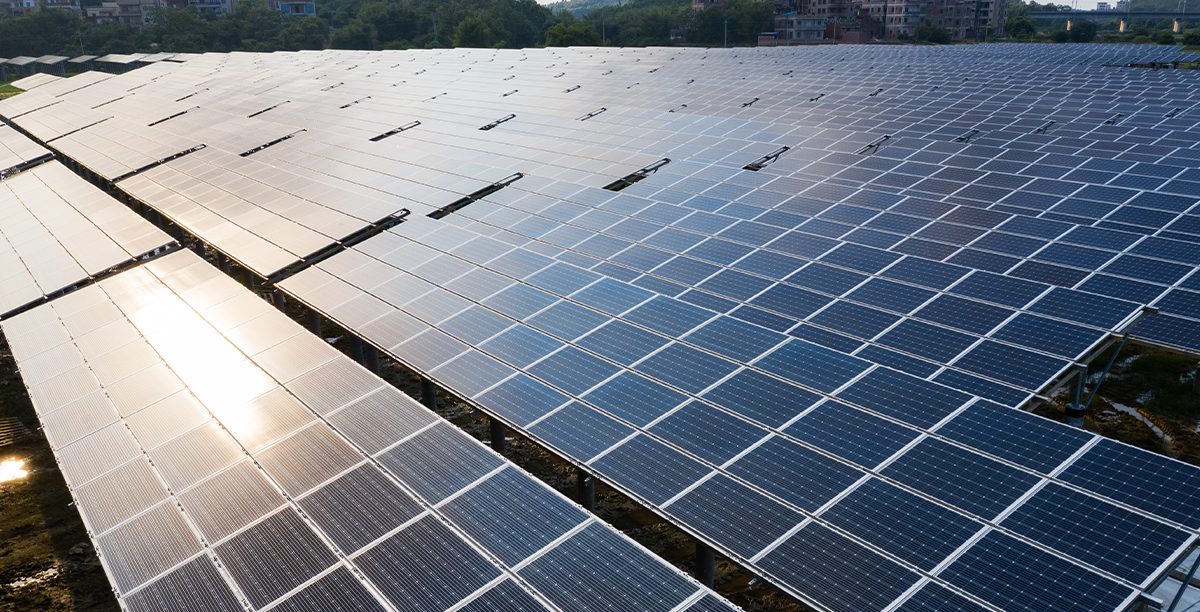
SCEF adds another Solar Asset to its Portfolio
[Guelph, Ontario – October 31, 2022] On October 31, 2022, Skyline Clean Energy Fund acquired a ground-mounted solar system through the purchase of 100% of the units in Balsam Lake Limited Partnership, and 100% of the shares in the General Partner. The ground mounted solar asset is located at 1246 Northline Road, City of Kawartha [...]